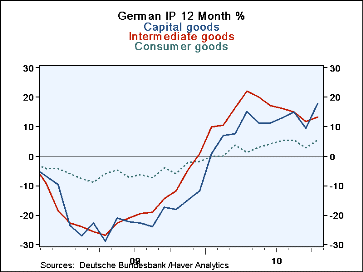 Global| Dec 08 2010
Global| Dec 08 2010German IP Perks Up on Capital Goods
Summary
German IP picks up after drop - The pick-up in German IP is good news. Unfortunately it is still IP rising on the back of capital goods output. The capital goods sector is the backbone of the German export machine. Capital goods [...]
Domestic-Sourced Growth Remain Elusive
 German IP picks up after drop - The pick-up in German IP is good news. Unfortunately it is still IP rising on the back of capital goods output. The capital goods sector is the backbone of the German export machine. Capital goods output surged by 4.6% in October after being flat in September. Consumer goods shipments rose by 0.8% in October after dropping by 0.2% in September. Intermediate goods output recovered from a Sept drop of 1.8% to rise by 2.9% in October.
German IP picks up after drop - The pick-up in German IP is good news. Unfortunately it is still IP rising on the back of capital goods output. The capital goods sector is the backbone of the German export machine. Capital goods output surged by 4.6% in October after being flat in September. Consumer goods shipments rose by 0.8% in October after dropping by 0.2% in September. Intermediate goods output recovered from a Sept drop of 1.8% to rise by 2.9% in October.
German business as usual - With the surge in capital goods output we have a pretty good idea that this is business as usual. That means the rise in domestic IP is not evidence that the recovery is spreading to the domestic economy in any direct way. It is true that any ramp up in domestic output for any reason boosts the German economy and since it puts German workers to work and uses Germany factories there is some multiplier effect from it. But there is no evidence of a direct pick up in output to service increased domestic demand.
No shifting of gears evident here - Over three-months consumer output is up at a 5.2% pace compared to 5.4% Yr/Yr. There is little evidence of a boost there. But capital goods output is up at a 32% pace over three-months compared to 18% Yr/Yr. Intermediate goods output is up at an 11% pace over three-months compared to 13% Yr/Yr.
Divergent trends - German unemployment is at an 18 year low. There are good reasons to look for the German domestic economy to begin to flourish. At the same time Germany reported a drop in exports in October. The weakness in the Zone is beginning to take some toll. Because of these divergent trends I am knit-picking about which demand is up and where demand is coming from.
New source of growth or not? Weakness in German exports could pull growth down. But resurgent domestic growth could provide a counter balance. Even with some weakness in the Zone we have documented that German manufacturers have a built-in pricing edge from years of running a lower-than-EMU-average inflation rate. Still, without demand even the most competitive firm will have to scale back. The question is if domestic demand will well up and if it will be strong enough to provide a counter punch to the weakness that austerity is bringing to the rest of the zone. So far the answer to that question remains elusive. We see the evidence of weaker German exports but IP is still strong. We see lower unemployment but demand has not really impacted output. We will continue to watch these trends.
| Total German IP | |||||||
|---|---|---|---|---|---|---|---|
| Saar exept m/m | Oct-10 | Sep-10 | Aug-10 | 3-Mo | 6-Mo | 12-Mo | Qtr-to-Date |
| IP Total | 2.9% | -1.0% | 1.5% | 14.1% | 12.6% | 11.7% | 7.2% |
| Consumer | 0.8% | -0.2% | 0.7% | 5.2% | 7.8% | 5.4% | 4.3% |
| Capital | 4.6% | 0.0% | 2.3% | 31.2% | 23.0% | 17.8% | 18.7% |
| Intermediate | 2.9% | -1.8% | 1.7% | 11.1% | 11.3% | 13.3% | 3.9% |
| Memo | |||||||
| Construction | 1.3% | -0.2% | -0.2% | 3.9% | -1.2% | 6.8% | 3.5% |
| MFG IP | 3.1% | -0.8% | 1.9% | 17.9% | 15.3% | 13.5% | 9.7% |
| MFG Orders | 1.6% | -4.0% | 0.0 | 4.2% | 6.0% | 18.1% | -6.9% |
Robert Brusca
AuthorMore in Author Profile »Robert A. Brusca is Chief Economist of Fact and Opinion Economics, a consulting firm he founded in Manhattan. He has been an economist on Wall Street for over 25 years. He has visited central banking and large institutional clients in over 30 countries in his career as an economist. Mr. Brusca was a Divisional Research Chief at the Federal Reserve Bank of NY (Chief of the International Financial markets Division), a Fed Watcher at Irving Trust and Chief Economist at Nikko Securities International. He is widely quoted and appears in various media. Mr. Brusca holds an MA and Ph.D. in economics from Michigan State University and a BA in Economics from the University of Michigan. His research pursues his strong interests in non aligned policy economics as well as international economics. FAO Economics’ research targets investors to assist them in making better investment decisions in stocks, bonds and in a variety of international assets. The company does not manage money and has no conflicts in giving economic advice.
More Economy in Brief
 Global| Feb 05 2026
Global| Feb 05 2026Charts of the Week: Balanced Policy, Resilient Data and AI Narratives
by:Andrew Cates






